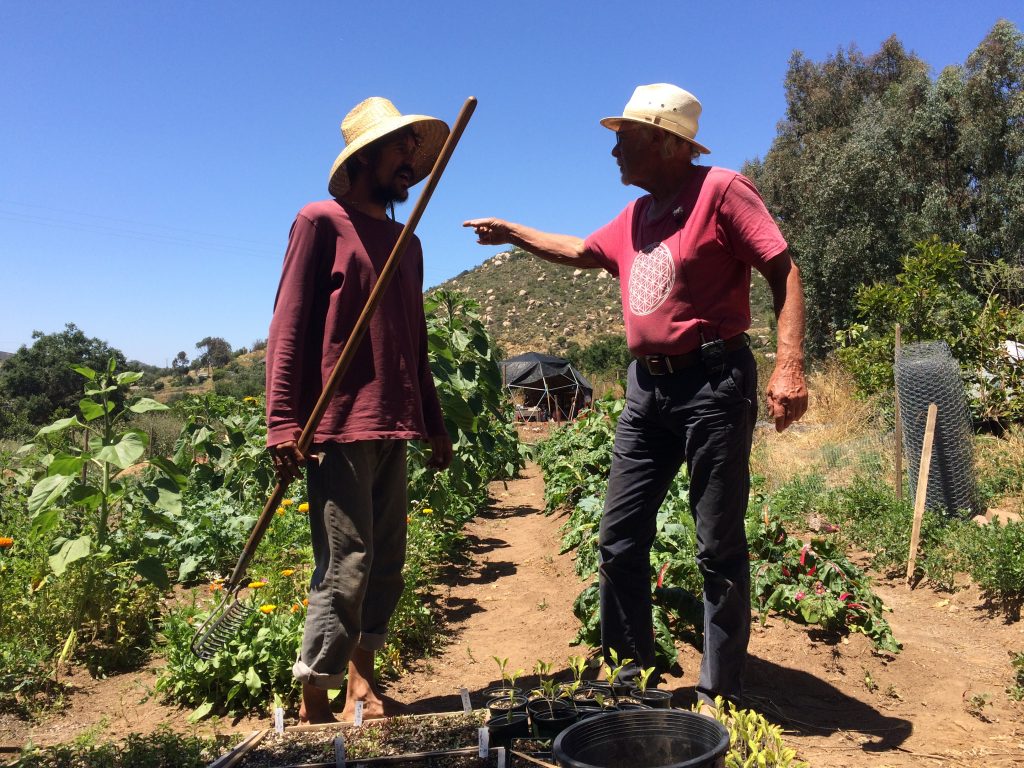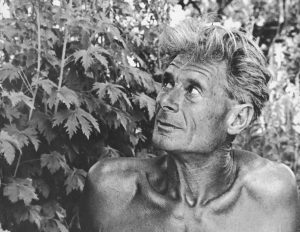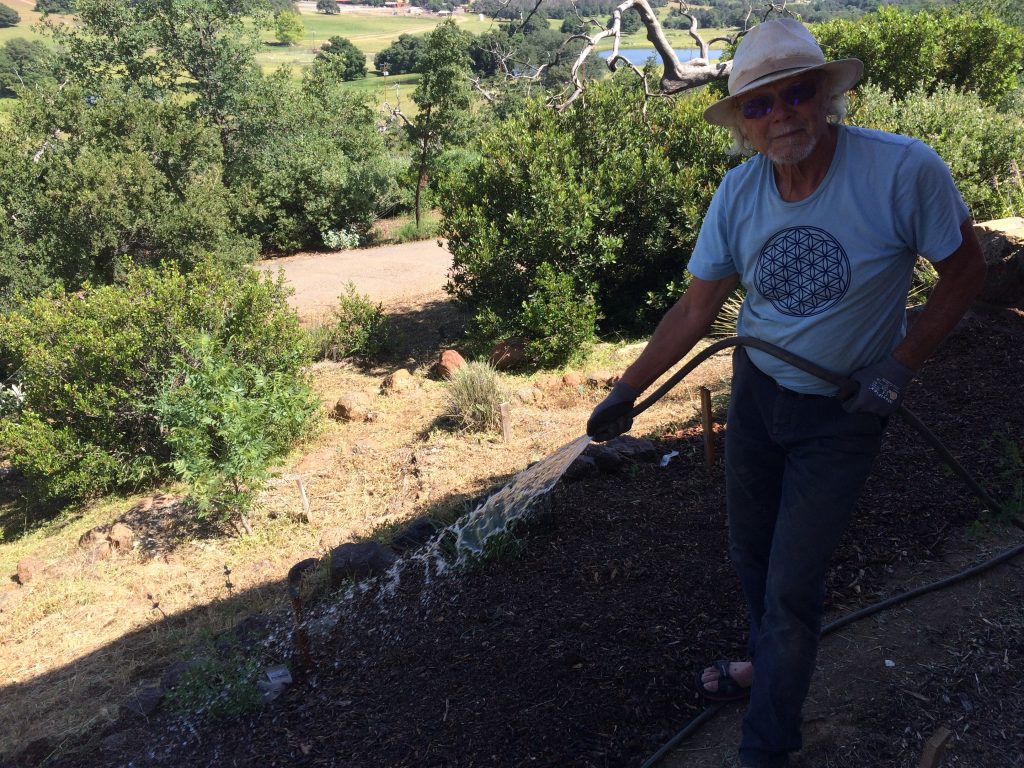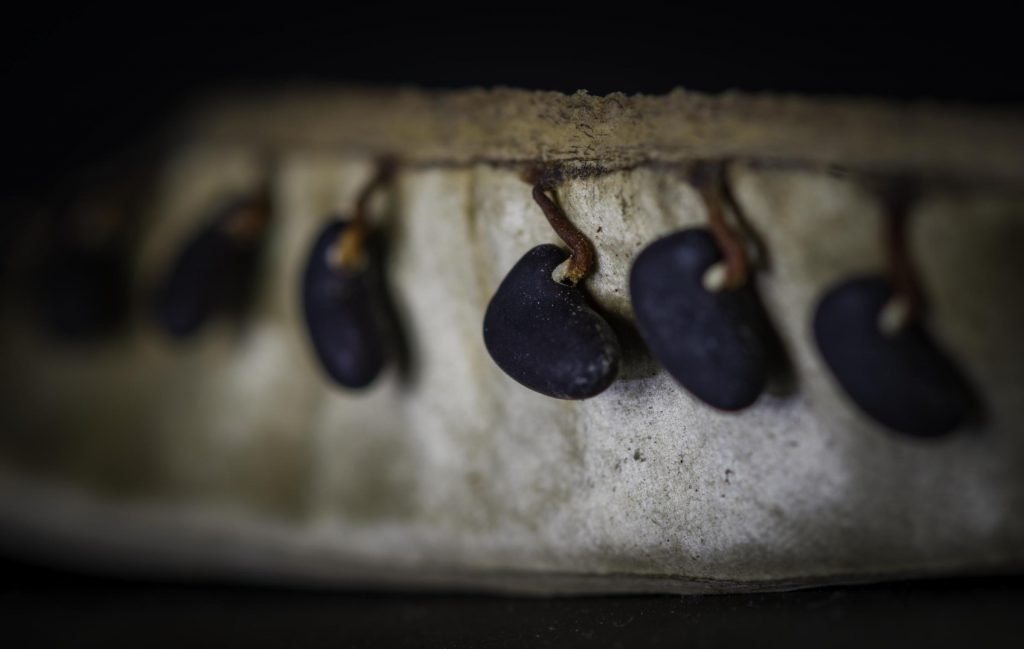
Juaquin Hershman with his former student Hans Erik Hjermstad in the Terra Madre Gardens, California. Photo by Morten Steiniche.
If you really want to understand nature, you must grab the Dutch hoe and get out into the garden, Master Horitulturist Juaquin Hershman says. The foundation of our lives is hidden in a few fragile inches of soil. Hershman himself has collected seeds for 40 years. ‘The seed. The manifestation of life. All is contained in this tiny little embryo.’
By Morten Steiniche
SAN DIEGO – It is noon, the Sun beats down from a clear blue sky and with the exception of the cicadas’ constant sound, the valley is quiet, compared to when we arrived earlier and the birds, insects and many other animal inhabitants in this fertile region created an inferno of sounds.
“Nature goes to rest in this heat. It’s very dry. No water. That’s when the ants disappear and no moisture of any kind is circulated. Everything rests, including the plants,” Juaquin Hershman says. He then shows me, how the leaves of a bush have collapsed as a means of protection against the Sun and the heat.
“Nature has a response to the heat. Everything that happens in nature also has a response.”
Juaquin Hershman, 76, is a horticulturist. He is here to landscape a garden at the country house of a famous Californian artist and architect in the mountains Northeast of San Diego, California.
‘Nature knows best’ is his mantra, which explains his entire understanding of Nature. We humans must oblige to and understand its patterns and rhythms, whether it is a matter of growing carrots or finding solutions on how to cope with climate changes. This gardener has an understanding of all living beings in Nature as being interconnected and that is why I have asked him for this interview.
“Look,” he says while crouching and gently brushing his hand across the soil.
“There is band that keeps us alive. It is a half inch above the earth and to inches below the earth. That is kept open for the Planet so that everything can penetrate and breathe back out again. That is the foundation of our life. That is the skin of the earth. That’s where all the insects, the bugs are, everything. It crawls, it creeps, it scratches, it pegs. This system below the surface is the cradle of fertility of our Planet. So this little band that we hardly ever think about except if you are a gartner, makes you realise the fragileness of how we live and how all of Nature flourish. And if we destroy this band we destroy the foundation of our own existence.”
“And if we learn to value and respect the Earth and its life, then we will understand the secret to making plants grown and that the preparation of the soil is the secret to making it fertile before we plant the seeds and saplings.”
The Master’s Master
I met Juaquin Hershman a few years ago in Bali, where he was constructing a vegetable garden at a private resort for one of his clients. The list includes numerous famous people. In certain communities, they call him a ‘garden yogi’, others an agro-philosopher but his name card simply presents him as the master in gardening that he in fact is, ‘Master Horticulturist’.
He constructed a garden for Oprah Winfrey at her property in Hawaii as one of the last projects he completed before a stroke forced him to take a break.
As the son of a wealthy Jewish family in New York, who had fled during World War II, Juaquin was expected to become a businessman like his father. But as The Summer of Love exploded in a love revolution in 1967 he went to San Francisco, let his hair down and did LSD with Grateful Dead.
After the hippie years subsided he travelled to Mexico, where he and his girlfriend planted a vegetable garden. They persuaded a restaurant to serve a vegetarian menu, based on the vegetables from their garden. The interest in vegetable gardening connected him to Alan Chadwick in the early 1970’ties. Chadwick is one the leading profiles in the organic movement in USA.
Alan Chadwick was English and of a wealthy family with an aristocratic air. As a child he received private tutoring by Rudolf Steiner, who allegedly tied the boy to a tree as part of a demonstration of the force of Nature.
Steiner taught Chadwick everything about biodynamic and organic gardening, using compost with all steps of the process finely tuned to the rhythms of Nature. Chadwick became a specialist in the method of high beds and this enabled him to produced food from the vegetable gardens at a large scale with the use of only few resources. The gardens were always a display of numerous colours and a huge variety of species.
“Diversity, a myriad of trees, flowers, herbs, ground covers, every mixture. Just like you will see in nature. That’s how nature works. Color, texture, things that are low, things that are high, things that are underground, things that are above the ground, woody things, tender things. Alan Chadwick fused all the different elements of nature, because he understood how the elements are interconnected,” Juaquin Hershman tells me.
Chadwick believed that the four seasons are represented during one day. Spring is in the morning hours, Summer is during midday, Autumn is during twilight and Winter is at midnight.
Alan Chadwick constructed his first American garden at the University of California in Santa Cruz exactly 50 years ago. At that time most people in USA had never heard of biodynamic vegetable gardens but that was soon to become well know by the help of the always immaculately well dressed Englishman.
But Chadwick was a rebel who hated the industrialized profit based farming and he was the personification of a vitalist, who attaches a spiritual life force to Nature.
He represented the essence of the ‘zeitgeist’.
The students loved him, but the management at the university had a hard time coping with his radical ideas and after a few years, they fired him. Today Chadwick is rehabilitated and the 50-year anniversary for the construction of the Chadwick-garden at University of California is being celebrated this year. He is honored as a pioneer of the American environmental movement with peers such as Rachel Carson, Henry Thoreau, John Muir and Aldo Leopold.
Finding yourself in gardening
“Coming from the East coast I never had the thought that nature is alive, and that the Earth is breathing and therefore must be treated with respect,” says Juaquin Hershman, who studied under Alan Chadwick for two years. He has educated many students in the Chadwick techniques since then.
“Alan Chadwick always reminded us, that is the garden that makes the gardener, not the other way around. He taught us how to work in harmony with nature and always give back more to nature than you take. We didn’t learn to grow plants and flowers, but to grow soil. He taught us how to break up the soil without damaging it or hurting the worms and the living beings that were in there. And we learned how to make compost, and where to put it, so that life can grow.”
Composting is Nature’s way of decomposing organic matter from dead plants and animals, and returning the nutritionals back to the eco system. After the invention of pesticides, composting was considered old fashioned and non profitable but Alan Chadwick changed this.
“The fertility of a compost pile penetrates the entire body of the Earth. It is life into death and back into life,” says Juaquin Hershman.
When Alan Chadwick taught gardening, it was not only about techniques. It has been said about him, that he planted souls.
When we work with the soil, our bodies – the nervous system, the blood circulation – adjust to the rhythm in Nature and consequently, gardening is a deeply satisfying experience. This is recognized by many people with a garden, who feel that gardening can become almost meditative, balancing body and mind.
“Spirituality is to be entering into the process of growing soil. You enter into the invisible and come out with the manifestation of the seed. It is magic. It germinates with the magic of the invisible world. Rain comes, the clouds come, the Sun starts to come more each day,” Juaquin Hershman says.
Alan Chadwick passed away in 1980 at a zen meditation centre in California. Although he was an avid vegetarian, he was diagnosed with a type of cancer which a vegetarian diet is said to be able to prevent.
Seeds connect us to our past
Juaquin Hershman is just as critical and in opposition to industrial profit based farming as his master teacher. He shows me a bag of seeds during my visit to his autocamper, which is currently parked at a closed-down school in the town, Encinitas by the coast of the Pacific Ocean.
“The seed. The manifestation of life. The seed has all the nutrients, it has everything that is needed to open and expand, to crack, to live. All is held in this tiny, tiny little embryo that is surrounded by husk that is so hard that some seed can still germinate after decades or sometimes hundreds of years,” he says.
For more than 40 years Juaquin Hershman has gathered seeds. Farmers, gardeners and garden owners all over the world have always been sharing seeds and in recent years we have witnessed the start of seed banks, where seed are frozen and preserved to last for future use.
“Most of the seeds of today is owned by a small group of huge companies, and they are absolutely focusing on making the genetic pool smaller and smaller. Therefore it is more important now than ever before to preserve and grow seeds. And it is equally important to grow local food, in order for the seed to adapt to the local environment.”
The strong opposition against Monsanto and similar companies is based on the fact that their industrially manipulated seeds are destroying the biological diversity. Monsanto’s seeds are also less resilient compared to seed, which have been shared across local communities through generations.
The threat against biological diversity is not the only problem connected to the industrialized food production. Today most people have never grown their own vegetables and as such, according to Juaquin Hershman, we have become even further alienated towards Nature. Even though we are aware at some level that the cucumber we pick up from the supermarket must have grown on a tree or bush somewhere, we rarely make that connection, while shopping for groceries.
“The food of today is one of the reasons we’re in the trouble we’re in. Because it doesn’t feed us in a spiritual way. Most people don’t know anything about the food they eat. They don’t have the language to describe it. They just say if it tastes good or bad.”
But is it even possible for us – billions of people and many of us living in cities – to grow our own food again, I ask him.
“Everybody can grow food, and there is always place to grow them. If it’s not in your neighbourhood, it is close by. It is all about making the conscious choice to start to grow food,” he answers.
A few years ago he went to New York to construct vegetable gardens for eight schools and he shares who the children went through transforming experiences when they saw the seeds sprout, the vegetables grow in order to finally prepare and eat them.
“They tasted the food like they had never tasted it before.”
Gardening builds communities
We drive to visit the Californian agriculture entrepreneur, Daron Joffe aka ‘Farmer D’. He builds community farms in city zones, based on the concept that people living in cities will get a chance to connect with nature. This concept is also known in Denmark.
“We use farming to create communities among people in the local area. First of all it is to support the Jewish community to which I myself belong. Traditionally we have always learned about sustainable farming and this is now booming. We construct gardens in cities and suburbs to help the local community be self-sufficient with vegetables and fruit. Of course it is not restricted only to the Jewish community. Our purpose is to help all those who cannot afford food, no matter religion or beliefs”, says Farmer D, who is the author of ‘Citizen Farmers’.
Juaquin Hershman has planted a fruit forest for Farmer D where everyone can enter and pluck and eat the fruit they like. The idea is to create a connection for the guest in the fruit forest to Nature.
“Entering the cycle of nature, growing food or eating food we have picked from nature gives us an understanding of the dependence on nature. We start to slow down while eating. With every single bite we feel gratitude for the food and reverence towards nature. And once reverence sets in then you realize that you know what you need and that nature takes care of you. And that brings us a sense of power, a sensitivity and a clarity,” says Juaquin Hershman.
This will enable us to register changes in Nature’s elements at a larger scale, such as rain and wind but also the more subtle changes in Nature’s rhythms when it self-regulates, e.g. when Nature enters into a short hibernation during the scorching heat and it is best not to interfere.


